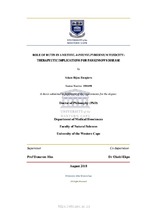Role of Rutin in 1-Mtthyl-4-Phenylpyridinium toxicity: Therapeutic implications for Parkinson's disease
Abstract
Parkinson’s disease (PD) is a common neurodegenerative disorder characterized by the
progressive loss of dopaminergic neurons in the substantia nigra pars compacta of the midbrain.
Although the etiology of PD is not completely known, it is believed to involve an association
of various genetic, cellular, and environmental factors that individually or simultaneously
advance neuronal degeneration. Neurotoxins such as 1-methyl-4-phenylpyridinium (MPP+) and
6-hydroxydopamine (6-OHDA) have been widely used to investigate distinct underlying
mechanisms involved in the pathogenesis of PD.
Presently, treatment options for PD are limited, as the available drugs are mainly focused on
alleviating symptoms with limited ability to prevent disease progression. Accordingly, there is
an increase in the use of natural compounds/products as potential neuroprotective agents. These
neuroprotective treatments are believed to intervene in some stages in the pathogenesis of PD
to suppress possible mechanisms of dopaminergic neuronal death such as apoptosis,
mitochondrial dysfunction, oxidative stress, disturbances of calcium homeostasis,
inflammation and autophagy. Thus, novel protective strategies for PD may be designed by
targeting these mechanisms or intracellular signaling cascades that participate in PD
pathogenesis.

